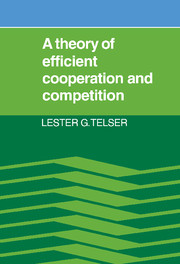Book contents
- Frontmatter
- Contents
- List of tables
- Preface
- Chapter 1 Prologue
- Chapter 2 Perceptions and reality: the genesis of the Sherman act
- Chapter 3 Competition, cooperation, and efficiency
- Chapter 4 Stable coalitions
- Chapter 5 Equilibrium with decreasing average cost: an application of the theory of the core illustrated by production and exchange among spatially separated markets
- Chapter 6 A theory of self-enforcing agreements
- Chapter 7 Some new results on duopoly applied to theories of Cournot, Bertrand, and Edgeworth
- Chapter 8 Rivalry by means of innovation
- References
- Index
Chapter 6 - A theory of self-enforcing agreements
Published online by Cambridge University Press: 03 November 2009
- Frontmatter
- Contents
- List of tables
- Preface
- Chapter 1 Prologue
- Chapter 2 Perceptions and reality: the genesis of the Sherman act
- Chapter 3 Competition, cooperation, and efficiency
- Chapter 4 Stable coalitions
- Chapter 5 Equilibrium with decreasing average cost: an application of the theory of the core illustrated by production and exchange among spatially separated markets
- Chapter 6 A theory of self-enforcing agreements
- Chapter 7 Some new results on duopoly applied to theories of Cournot, Bertrand, and Edgeworth
- Chapter 8 Rivalry by means of innovation
- References
- Index
Summary
A prudent ruler ought not to keep faith when by so doing it would be against his interest, and when the reasons which made him bind himself no longer exist. If men were all good, this precept would not be a good one; but as they are bad, and would not observe their faith with you, so you are not bound to keep faith with them. Nor have legitimate grounds ever failed a prince who wished to show colourable excuse for the nonfulfillment of his promise.
Niccolo Machiavelli, The PrinceIntroduction
A self-enforcing agreement between two parties remains in force only as long as each one believes himself to be better off by continuing the agreement than he would be by ending it. It is left to the judgment of the parties themselves to decide whether or not there has been a violation. If one party violates the terms, then the other party has as his only recourse termination of the agreement after he discovers the violation. No third party intervenes to determine whether a violation has taken place or to estimate the damages that may be attributed to such a violation. No third party decides whether a violation has been “will-ful” or “accidental.” A party to a self-enforcing agreement calculates whether the gain from violating the agreement is greater or less than the loss of future net benefits from detection of the violation and the consequent termination of the agreement by the other party.
- Type
- Chapter
- Information
- A Theory of Efficient Cooperation and Competition , pp. 187 - 219Publisher: Cambridge University PressPrint publication year: 1987



